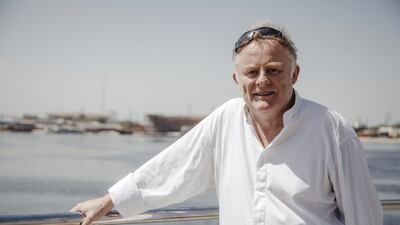Tom Callaghan’s work was read by millions even before he published his first novel at the start of the year.
The 59-year-old British author cut his teeth as a senior copywriter and creative director with international advertising firms in London, Singapore and Qatar, before settling in the UAE 15 years ago.
His work included a British television charity campaign featuring the Hollywood actor Richard Gere, released nearly two decades ago, in addition to catchy slogans that are regularly plastered across UAE signboards and billboards.
He has been even more successful with his debut crime thriller. A Killing Winter is backed by the United Kingdom publishing house Quercus, which was behind the mega-successful English translations of Stieg Larsson's Millennium series.
Callaghan says he wrote the novel after quitting the advertising game in 2012. He was motivated, he explains, by a compelling need to contribute something deeper than snappy headlines.
“The advertising industry changed beyond all recognition from when I started 35 years ago, and it increasingly became not the profession I knew,” he says.
“While I survived a lot longer than others and did pretty well at it, there does come a point in your life where you want to leave something a little bit more substantial than ‘sale now on’ or ‘must end on Friday’.”
On that score, Callaghan has achieved his goal.
A Killing Winter is a memorable crime thriller that is impressive not only for its terse and evocative writing style, but for introducing readers to a new anti-hero and location. Set in the bleak winter landscape of Kyrgyzstan, the novel introduces us to hard-boiled detective inspector Akyl Borubaev, who encounters corruption and warlords as he tries to solve the murder of an unidentified young woman.
The novel was launched this month during the Emirates Airline Festival of Literature, at which Callaghan delivered a sold-out writing masterclass.
It was at a similar session during the 2011 festival, run by the acclaimed British crime author Mark Billingham, where Callaghan found the creative spark to get started on A Killing Winter.
“He gave everyone a choice of six sentences as an opening line,” he says. “And mine was: ‘Fresh blood is especially vivid against snow.’
“That survived as the opening line of my book. I already had the idea for the story and the session gave me the push to get on with it.”
Ever the marketing man, Callaghan chose to set A Killing Winter in the obscure-to-many former Soviet country to set himself apart from the crime-writing pack.
“Elmore Leonard has done Detroit and Miami, Ed McBain has done New York, Michael Connelly and Raymond Chandler did LA, and from Arthur Conan Doyle to Mark Billingham – they did London,” he says.
“If you use the same places that the masters have used, it just becomes another obstacle to overcome. With Kyrgyzstan, nobody has written about it. It also had two revolutions in 10 years – it is unstable with lots of corruption, which are all perfect conditions for a crime novel.”
Callaghan’s realistic description is not simply lifted from the headlines, however. He has in-depth knowledge of the country’s society – his ex-wife is Kyrgyzstani and he travels there about four times a year to visit his stepson.
“Having a Kyrgyz family also gives you a deeper access to the community in a way that tourism never does and I always found the people generally very friendly.
“There is also this thing where I get stopped by the traffic police all the time in Kyrgyzstan with an on-the-spot fine. That is known locally as breakfast money, that’s just how it works,” he says.
After completing two unpublished novels while in his 40s, Callaghan came up with a plan of attack for A Killing Winter – to spend 2012 with the non-negotiable goal of completing 500 words a day.
He knew he was on to a winner after sending the first five chapters to his friend Trevor Hoyle, a British novelist and playwright.
“He said: ‘Let’s go for a drink where I will then put poison in your beer, dump your body in a reservoir and then claim the manuscript’ as his own,” Callaghan says. “So, you know, what greater compliment can you have?”
As well as working on the next instalment of the Akyl Borubaev series, Callaghan is considering setting up an online writing community and conducting further writing workshops to help out fellow budding novelists.
“In advertising there is this saying that we should send the lift down,” he says. “I know that writing is a very lonely profession and I would like to help people find that little bit of support during that process.
“I would be happy if five years down the line, someone sold a million copies and said: ‘I got that idea from attending a workshop by Tom Callaghan.’”
• A Killing Winter by Tom Callghan is out now. For more information, visit www.tomcallaghanwriter.com


